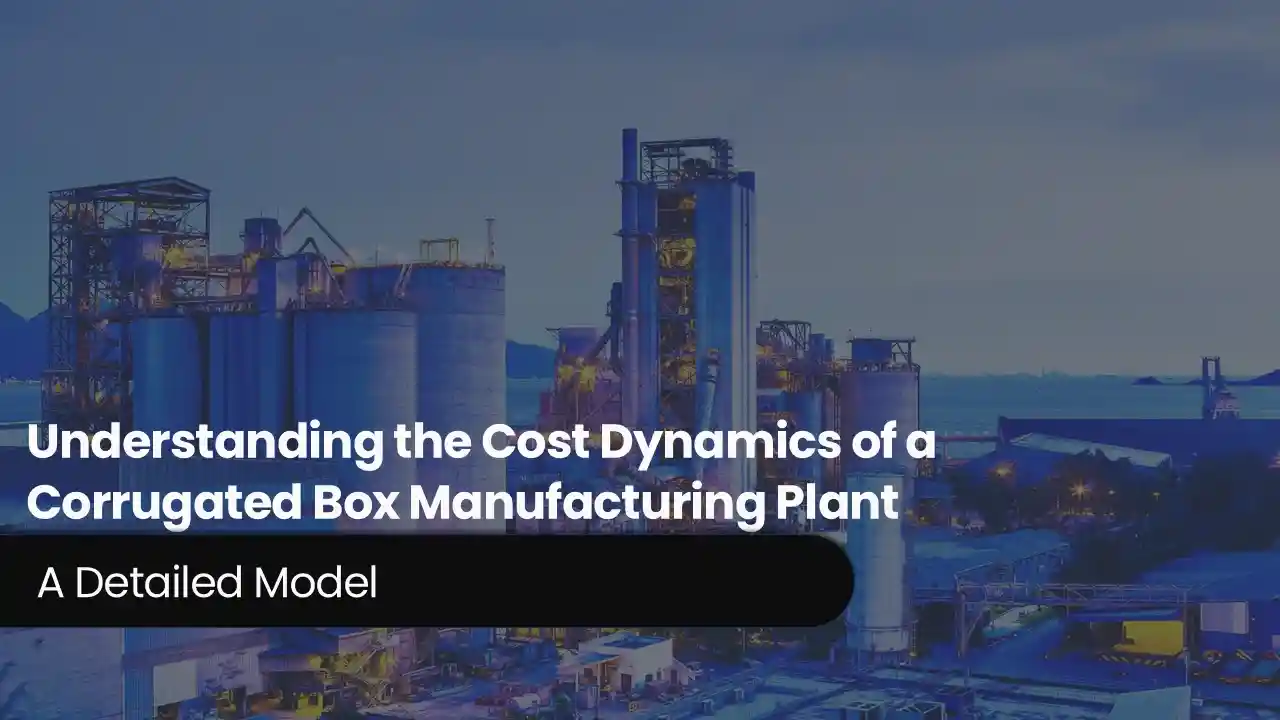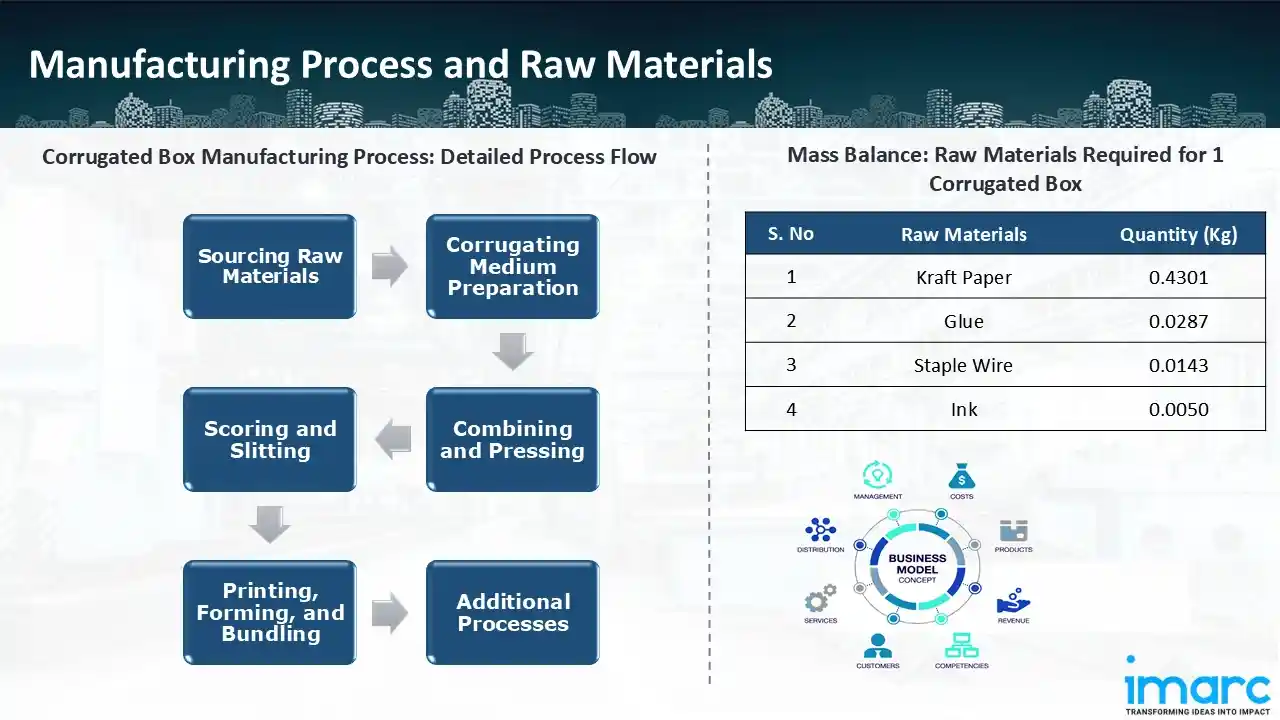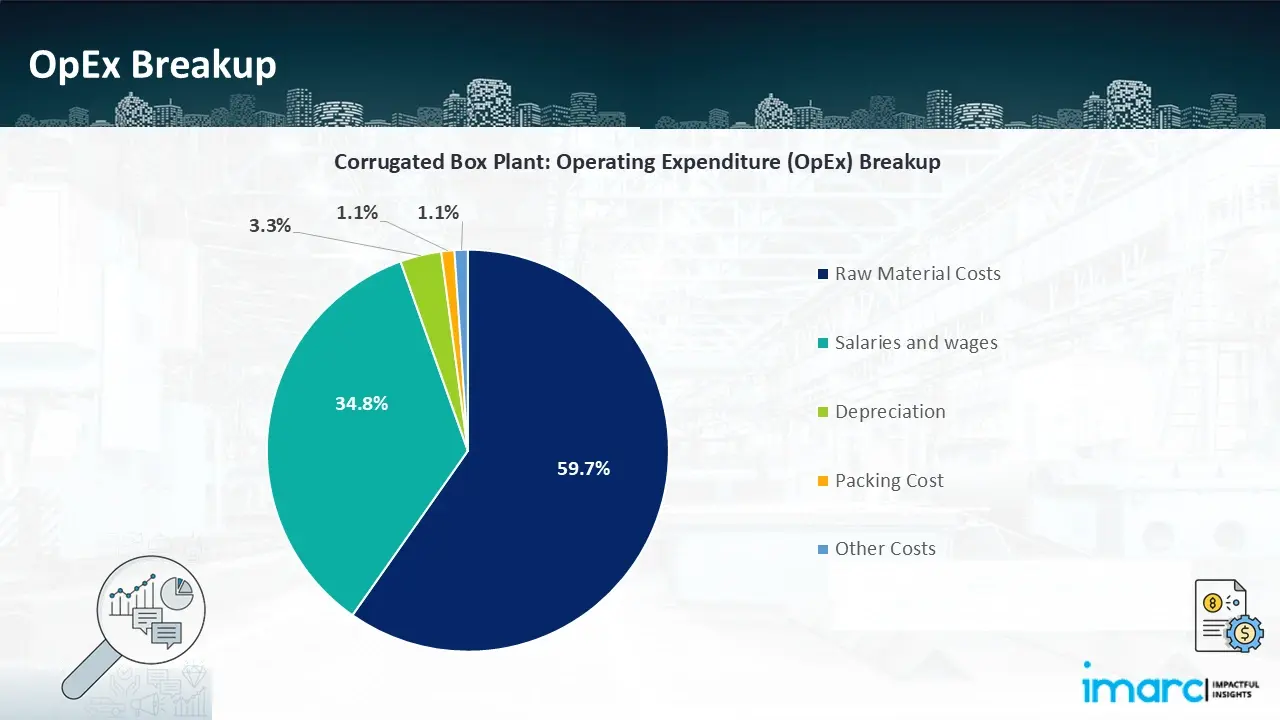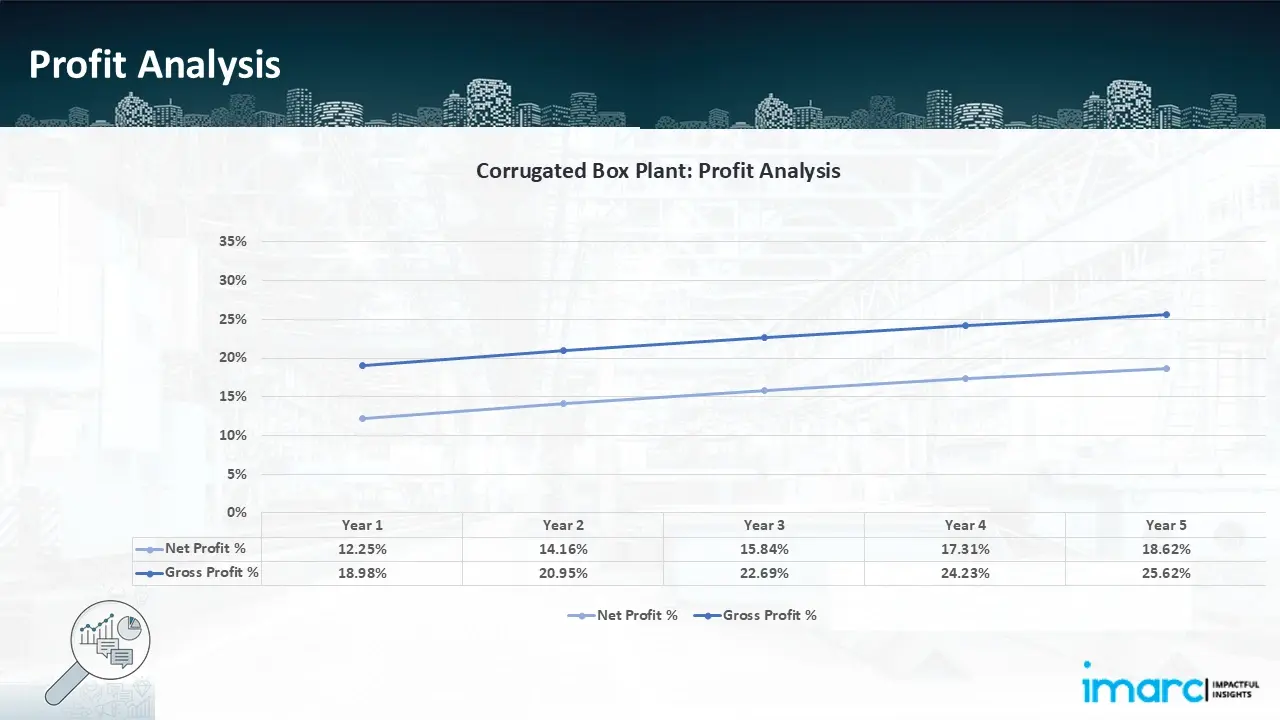Understanding the Cost Dynamics of a Corrugated Box Manufacturing Plant: A Detailed Model

What is Corrugated Box?
The corrugated box industry is powered by its versatility, strength, and sustainability, rendering it crucial for shipping, storage, and retail packaging.
Key Applications Across Industries:
Crafted from kraft paper, the boxes are strong, cushioned, and protective, serving e-commerce, food & beverage, electronics, and pharmaceuticals industries. Online retailing demand, sustainability drives, and innovation in packaging are driving the growth of the market. As more stress is laid upon recyclable and biodegradable materials, corrugated boxes continue to be the first option for companies that want cost-saving, environmentally friendly packaging. Their versatility for individualized designs, resistance to moisture, and printability also further their position in contemporary supply chains.
What the Expert Says: Market Overview & Growth Drivers
As per an IMARC study, the corrugated box market across the globe was worth USD 212.3 Billion in 2025. In the future, the market is anticipated to expand at a CAGR of around 2.05% during 2026-2034, reaching a size of USD 255.8 Billion by 2034. The corrugated box market globally is driven by a number of major factors, mainly the growth of e-commerce, green packaging trends, and growing logistics networks.
The expansion of e-commerce and food delivery has substantially raised demand, especially in areas that are investing in digital economies. Other sectors like electronics, pharmaceuticals, and consumer goods also continue to depend on corrugated packaging for economical, protective, and customizable solutions. Sustainability laws and business efforts encouraging biodegradable and recyclable materials are also influencing market trends. Advances in technology, such as lightweight but strong construction and enhanced resistance to moisture, are increasing product effectiveness. Demand is being fueled by the growing economies of Asia, Latin America, and Africa as a result of accelerated industrialization and urbanization. As companies focus on supply chain effectiveness and sustainable packaging, corrugated boxes continue to be an integral part of contemporary commerce, adapting to the shifting needs of international trade, environmental regulations, and creative packaging solutions.
Case Study on Cost Model of Corrugated Box Manufacturing Plant:
Objective
One of our clients has approached us to conduct a feasibility study for establishing a mid to large-scale corrugated box manufacturing plant in United States.
IMARC Approach: Comprehensive Financial Feasibility
We have developed a detailed financial model for the plant's setup and operations. The proposed facility is designed with a production capacity of 5 million corrugated boxes per year.
Manufacturing Process: The production of corrugated boxes is a multi-step process that guarantees durability, strength, and accuracy. The process starts with the procurement of raw materials, mainly containerboard and linerboard, that offer structural strength and a printable smooth surface. Then, in the corrugating medium preparation phase, the containerboard is heated and softened using steam prior to being processed through corrugating rolls to form the signature fluted design. In combining and pressing, the fluted medium is glued together with linerboard through an adhesive mixture to create a strong corrugated board. The scoring and slitting step then trims and indents the board for accurate folding. In the printing, forming, and bundling process, boxes are printed, cut, folded, glued, and bundled for shipping. Other processes such as punching, creasing, and wax coating can be added to add functionality, e.g., waterproofing or special shaping. These processes in combination ensure corrugated boxes are up to industry standards for packaging and protection.

Get a Tailored Feasibility Report for Your Project Request Sample
Mass Balance and Raw Material Required: The primary raw materials utilized in the corrugated box manufacturing plant include kraft paper, glue, staple wire and ink. To manufacture 1 corrugated box, we require 0.4301 Kg kraft paper, 0.0287 Kg glue, 0.0143 Kg staple wire and 0.0050 Kg ink.
List of Machinery:
The following equipment was required for the proposed plant:
- Autobox
- Cross Cutting Module
- Punching Module
- Automatic Roll Feeder
- Module With 2 Scalpel Knifes
- Automatic Setup Creasing Rolls
- Flexo Print Module
- Automatic Scoring Knifes
Techno-Commercial Parameter:
- Capital Investment (CapEx): Capital expenditure (CapEx) in a manufacturing plant includes various investments essential for its setup and long-term operations. It covers machinery and equipment costs, including procurement, installation, and commissioning. Civil works expenses involve land development, factory construction, and infrastructure setup. Utilities such as power, water supply, and HVAC systems are also significant. Additionally, material handling systems, automation, environmental compliance, and safety measures are key components. Other expenditures include IT infrastructure, security systems, and office essentials, ensuring operational efficiency and business growth.
- Operating Expenditure (OpEx): Operating expenditure is the cost incurred to operate a manufacturing plant effectively. OpEx in a manufacturing plant typically includes the cost of raw materials, utilities, depreciation, taxes, packing cost, transportation cost, and repairs and maintenance. The operating expenses are part of the cost structure of a manufacturing plant and have a significant effect on profitability and efficiency. Effective control of these costs is necessary for maintaining competitiveness and growth.

- Profitability Analysis Year on Year Basis: The proposed corrugated box plant, with a capacity of 5 million corrugated boxes per year, achieved an impressive revenue of USD 5.3 million in its first year. We assisted our client in developing a detailed cost model, which projects steady growth, with revenue rising throughout the time period of 5 years. Gross profit margin improved from 18.98% to 25.62% throughout the years, and net profit went up from 12.25% to 18.62%, highlighting strong financial viability and profitability.

Conclusion & IMARC's Impact:
Our corrugated box manufacturing plant's financial model was meticulously modelled to satisfy the client's requirements. It provided a thorough analysis of production costs including capital expenditures, manufacturing processes, raw materials, and operating costs. The model predicts profitability while accounting for market trends, inflation, and any shifts in the price of raw materials. It was created especially to satisfy the demand of producing 5 Million corrugated box per year. Our commitment to offering precise, client-cantered solutions that ensure the long-term success of significant industrial projects by giving the client useful data for strategic decision-making is demonstrated by this comprehensive financial model.
Latest News and Developments:
- In January 2025, McKinley Packaging, a subsidiary of Bio Pappel, inaugurated a new corrugated box manufacturing plant in Lancaster, Texas, US. The 500,000ft² facility, which received its certificate of occupancy in late 2024, marks the company’s seventh packaging plant in the US. Known for its sustainable paper-based packaging solutions, McKinley Packaging aims to expand its production capacity while reinforcing its commitment to eco-friendly packaging.
- In June 2024, Froosh, the smoothie brand under Fazer, launched three new smoothies in 750ml cardboard packages. The new packaging is lightweight, easy to recycle, and significantly reduces carbon footprint. Compared to recyclable glass bottles of the same volume, the cardboard packages have up to 82% smaller carbon footprint. This move aligns with Froosh’s sustainability strategy, promoting eco-friendly packaging alternatives in the food and beverage industry.
- In January 2024, the 53rd GST Council meeting recommended a Goods and Services Tax (GST) reduction on all types of carton boxes from 18% to 12%. The tax cut is expected to benefit the packaging industry, making corrugated and carton boxes more cost-effective for manufacturers and businesses. The decision aims to boost domestic production, reduce costs for industries reliant on paper-based packaging, and encourage sustainable packaging solutions.
- In July 2023, Apex Packaging, Oman’s leading packaging solution provider, opened a new corrugated boxes manufacturing plant in Samail Industrial City. The plant produces cost-effective, eco-friendly, and fully recyclable packaging solutions, reinforcing the company’s environmental commitment. As the first Omani company to manufacture and innovate high-quality corrugated cardboard products, Apex Packaging plays a crucial role in meeting the increasing market demand for cardboard cartons and other packaging materials.
Why Choose IMARC:
IMARC's Financial Model Expertise: Helping Our Clients Explore Industry Economics
IMARC is a global market research company that offers a wide range of services, including market entry and expansion, market entry and opportunity assessment, competitive intelligence and benchmarking, procurement research, pricing and cost research, regulatory approvals and licensing, factory setup, factory auditing, company incorporation, incubation services, recruitment services, marketing and sales.
Brief List of Our Services: Market Entry and Expansion
- Market Entry and Opportunity Assessment
- Competitive Intelligence and Benchmarking
- Procurement Research
- Pricing and Cost Research
- Sourcing
- Distribution Partner Identification
- Contract Manufacturer Identification
- Regulatory Approvals, and Licensing
- Factory Setup
- Factory Auditing
- Company Incorporation
- Incubation Services
- Recruitment Services
- Marketing and Sales
Under our factory setup services, we assist our clients in exploring the feasibility of their plants by providing comprehensive financial modeling. Additionally, we offer end-to-end consultation for setting up a plant in India or abroad. Our financial modeling includes an analysis of capital expenditure (CapEx) required to establish the manufacturing facility, covering costs such as land acquisition, building infrastructure, purchasing high-tech production equipment, and installation. Furthermore, the layout and design of the factory significantly influence operational efficiency, energy consumption, and labor productivity, all of which impact long-term operational expenditure (OpEx). So, every parameter is covered in the analysis.
At IMARC, we leverage our comprehensive market research expertise to support companies in every aspect of their business journey, from market entry and expansion to operational efficiency and innovation. By integrating our factory setup services with our deep knowledge of industry dynamics, we empower our clients to not only establish manufacturing facilities but also strategically position themselves in highly competitive markets. Our financial modeling and end-to-end consultation services ensure that clients can explore the feasibility of their plant setups while also gaining insights into competitors' strategies, technological advancements, and regulatory landscapes. This holistic approach enables our clients to make informed decisions, optimize their operations, and align with sustainable practices, ultimately driving long-term success and growth.
Our Clients
Contact Us
Have a question or need assistance?
Please complete the form with your inquiry or reach out to us at
Phone Number
+91-120-433-0800+1-201-971-6302
+44-753-714-6104











